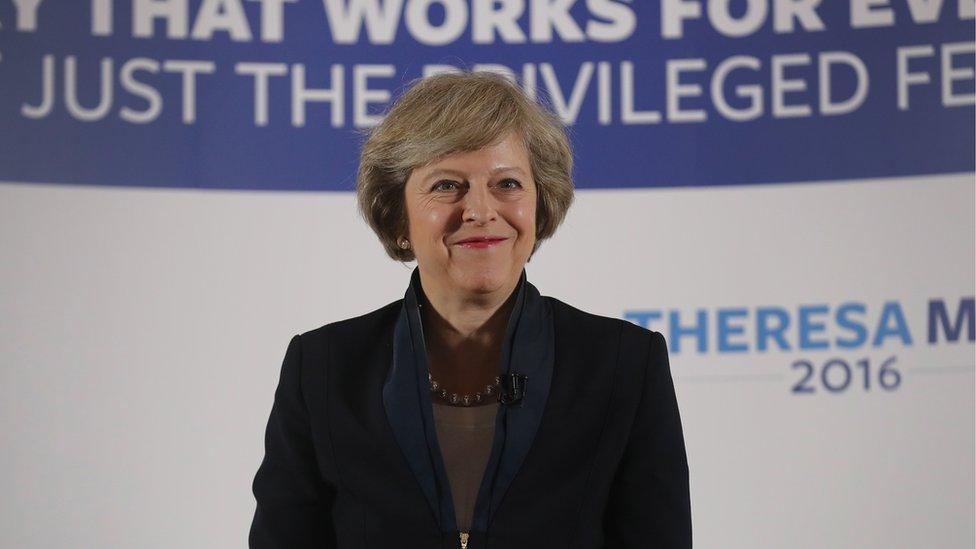Theresa May’s economic medicine
- Published
- comments

In her speech this morning - which has now taken on far more weight given that she is just about ready to measure the curtains for Number 10 - Theresa May laid out a set of policies that bring together two strands of thinking and two personalities who would not have been overly comfortable in each other's company - Ed Miliband and Margaret Thatcher.
The speech built on her article in The Times on Monday and is important for a number of reasons - not least its attempt to marry a general and widespread disillusion among the public that the economy "is not working for them" with a sense that the Conservative Party's driving philosophy is about more than free markets.
The first of these is straight from the playbook of Mr Miliband; the second is from Lady Thatcher.
Here's Mr Miliband at the time of the 2011 Labour Party conference where he announced plans to rein in "excessive pay".
'Bosses vs workers'
"This is not an anti-business message, this is an anti-business as usual message," he told the Today programme.
And here's Mrs May today, on her plans to tackle the "unhealthy and growing gap" between what she deliberately describes as "bosses" and "workers".
"It is not anti-business to suggest that big business needs to change," she said.
Now, of course Mrs May would be likely to splutter into her morning cup of tea if there was any suggestion that Mr Miliband was guiding her politically.
As she said in her speech this morning, the Home Secretary believes that Labour's approach to "equality" holds people back.
And she insisted the Conservatives remained the party of enterprise.
But Mrs May's pledges to put worker representatives on company boards (as well as "consumers"), to make shareholder votes on executive remuneration binding, to oblige companies to publish data on the pay multiple between a company's chief executive and the pay of the average worker, to have a "proper industrial strategy" that could be used to block takeovers such as Pfizer's attempt to buy AstraZeneca - all are certainly a substantial attempt to build the broadest of Tory tents.
Further, they are a deliberate economic pitch for the centre ground of politics, to a level of detail many will be surprised by.
Anyone who thought that a Conservative-led administration under Mrs May would not be interventionist when it comes to economic and business policy will certainly have to reconsider.
Mrs May even had some words for policy makers at the Bank of England, saying that ultra-low interest rates had helped home owners over those struggling to clamber on the housing ladder.
'Communities'
So, where does Lady Thatcher fit in?
Rather more subtly, but still distinctly, in the line: "We don't just believe in markets, but in communities."
Lady Thatcher was clear on her distrust of "big state" solutions and spoke regularly of communities of people, even "society" despite the oft-quoted line that there was "no such thing".
She said that people should be allowed to get on and should prosper, as long as they played by the rules.
Mrs May appears to be echoing the sentiment, replacing the "big state" with "big business" and "vested interests".
She vowed to take them on, tying a reformist line directly from Robert Peel to Joseph Chamberlain to Lady Thatcher.
Mrs May also spoke of "leading on behalf of the people".
Many argue that Brexit uncertainty will make the fortunes of the UK economy over the coming months and years difficult to forecast.
Mrs May, launching herself as the UK's next prime minister, appears to want to be tested on whether that economy is seen as working for everyone.